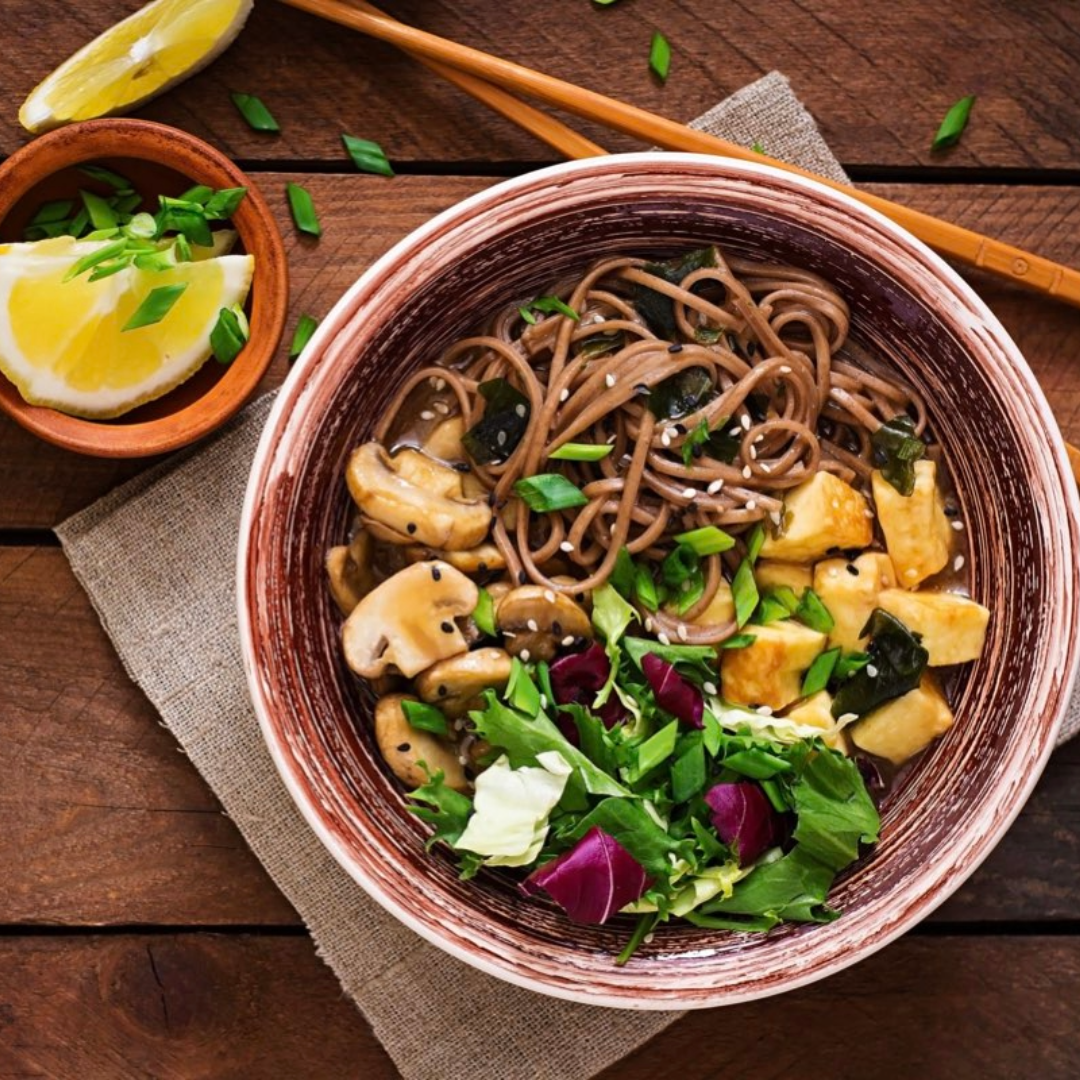The Okinawan Diet: A Path to Longevity and Health

The Okinawan diet, originating from the Ryukyu Islands of Japan, has long been associated with exceptional longevity and low rates of chronic diseases. Okinawa is often referred to as one of the world's "Blue Zones," areas where people live significantly longer than average and remain healthy well into their later years.
With a diet rich in nutrient-dense, plant-based foods, the Okinawan diet offers valuable lessons in maintaining a healthy lifestyle.
In this article, we’ll explore what the evidence has to say about the Okinawan diet, its key components, and its pros and cons.
What is the Okinawan Diet?
The Okinawan diet is known for its high consumption of vegetables and plant-based foods (about 90%), alongside a moderate intake of fish and minimal consumption of meat and dairy. Key components include:
- Sweet Potatoes: The primary carbohydrate source, rich in fibre, vitamins A and C, and antioxidants.
- Vegetables: Leafy greens, bitter melon, and seaweed provide an array of nutrients and phytochemicals.
- Soy-Based Foods: Tofu and miso are staples, offering plant-based proteins and isoflavones, which are associated with improved cardiovascular health.
- Limited Meat and Seafood: While some fish is consumed, red meat is rarely eaten, and processed foods are minimal.
- Herbal teas: Jasmine and green tea, both known for their antioxidant properties.
- Low Dairy Intake: The traditional diet includes very little dairy, with calcium typically coming from plant-based sources like leafy greens and tofu.
- Moderate calorie intake: Caloric restriction is a natural byproduct of the Okinawan diet, with a focus on eating until you are about 80% full (known as "hara hachi bu").
Pros of the Okinawan Diet
1. Longevity and Healthspan
The Okinawan population is renowned for its high number of centenarians and overall longevity.
- Research indicates that Okinawans have one of the highest life expectancies globally, with significantly lower mortality rates from heart disease, stroke, and cancer compared to other Japanese populations1. A study showed that Okinawan elders have a 40% greater chance of living to 100 years than their counterparts in mainland Japan2.
- The diet's low caloric intake combined with high nutrient density may promote beneficial gene expression related to aging and reduce metabolic stress, contributing to a longer healthspan.
- Adopting the Okinawan diet may enhance longevity and reduce the risk of age-related diseases by promoting overall health and vitality.
2. Nutrient Density and Antioxidant Intake
Rich in a variety of vegetables, fruits, and legumes, the diet provides an abundance of essential nutrients and antioxidants.
- The high consumption of antioxidant-rich foods like sweet potatoes, turmeric, and seaweeds contributes to a high intake of vitamins A, C, E, and flavonoids. These antioxidants combat oxidative stress, which is linked to chronic diseases.
- For example, the purple sweet potato is rich in anthocyanins, potent antioxidants that may have anti-inflammatory and anti-cancer properties.
- A nutrient-dense diet supports immune function, reduces inflammation, and promotes cellular health, potentially lowering the risk of chronic illnesses.
3. Weight Management and Metabolic Health
The practice of Hara Hachi Bu, or eating until one is 80% full, promotes caloric moderation and mindful eating habits.
- Studies have found that caloric restriction without malnutrition can improve metabolic health markers, including insulin sensitivity and lipid profiles3. Okinawans traditionally consume about 11% fewer calories than average Japanese diets.4,5
- Caloric moderation may activate metabolic pathways associated with longevity, such as reduced insulin-like growth factor (IGF-1) signaling.
- Helps maintain a healthy weight, reduces obesity-related risks, and supports metabolic health.
4. Reduced Chronic Disease Risk
The diet's emphasis on plant-based foods and healthy fats contributes to cardiovascular health and disease prevention.
- Okinawans have a 80% lower risk of mortality from heart disease and a 40% lower risk of death from cancer compared to Americans1.
- The diet's high fibre content aids in reducing cholesterol levels and maintaining healthy blood pressure.
- Omega-3 fatty acids from fish and seaweed consumption reduce inflammation and support heart health.
- Lowers the likelihood of developing chronic diseases such as type 2 diabetes, hypertension, cardiovascular disease and certain cancers6,9.
5. Gut Health Enhancement
The diet includes fermented foods and high-fibre ingredients that support a healthy gut microbiome.
- Fermented foods like miso and pickled vegetables introduce beneficial probiotics, which improve digestion and may enhance immune function7.
- A healthy gut microbiome is linked to better nutrient absorption, reduced inflammation, and overall well-being.
6. Sustainability and Environmental Impact
The predominantly plant-based nature of the Okinawan diet has a lower environmental footprint.
- Plant-based diets are associated with reduced greenhouse gas emissions and more sustainable land and water use compared to meat-heavy diets8.
- Adopting the diet contributes to environmental conservation efforts while promoting personal health.
Cons of the Okinawan Diet
1. Cultural and Accessibility Challenges:
Replicating the Okinawan diet outside its native context can be difficult.
- Traditional ingredients like goya (bitter melon), purple sweet potatoes, and specific seaweeds may not be readily available in all regions.
- Limited access to authentic ingredients can hinder adherence and reduce the potential benefits of the diet.
- Solution: Substitute with locally available, nutritionally similar foods or seek out specialty markets that offer Okinawan ingredients.
2. Potential Nutrient Gaps:
While nutrient-dense, the diet may lack certain nutrients commonly obtained from animal products.
- Potential for low intake of certain nutrients like vitamin B12, iron, and calcium.
- Without careful planning, individuals may develop nutrient deficiencies that could affect their health.
- Solution: Incorporate fortified foods, supplements, or alternative sources such as fortified plant milks, tofu made with calcium sulfate, and algae-based omega-3 supplements.
3. Caloric Restriction Risks:
The practice of caloric restriction may not be suitable for everyone.
- Individuals with higher energy needs, such as pregnant women, children, adolescents, and athletes, may find the diet insufficient.
- Risk of undernutrition, decreased energy levels, and potential negative effects on growth and development.
- Solution: Adjust caloric intake to meet individual energy requirements and consult a healthcare professional for personalized guidance.
4. Potential for Monotony and Difficulty with Adherence
Switching to the Okinawan diet may require significant lifestyle adjustments and a limited variety of foods may lead to dietary boredom.
- Changing long-standing eating habits can be challenging and may involve a learning curve. Also, the diet's heavy reliance on certain staples might reduce meal diversity.
- Initial difficulty in meal planning and potential resistance from family member, alongside monotony can decrease long-term adherence and enjoyment of meals.
- Solution: Gradually introduce Okinawan dietary elements and involve family in meal preparation to ease the transition. Explore a wide range of recipes and include a variety of fruits, vegetables, grains, and legumes within the diet's framework.
5. Economic Considerations
Cost can be a barrier to adopting the diet.
- Fresh produce, specialty items, and seafood can be more expensive than processed or conventional foods.
- Financial constraints may limit access to the diet's recommended foods.
- Solution: Prioritize seasonal and locally available produce, consider community-supported agriculture (CSA) programs, and plan meals to reduce waste and cost.
How Genetics Can Influence Response to the Okinawan Diet
Understanding your genetic makeup can provide insights into how you might respond to the Okinawan diet. Here are a few examples of how genetics may play a role:
- Carbohydrate Sensitivity: The Okinawan diet is rich in carbohydrates, primarily from sweet potatoes. Individuals with genetic variations that affect carbohydrate metabolism might need to monitor their intake to prevent blood sugar spikes.
- Omega-3 Processing: Genetic variations can influence how effectively your body converts plant-based omega-3s (from sources like seaweed) into the active forms (EPA and DHA). If your body struggles with this conversion, you may benefit from adding fish or omega-3 supplements .
- Nutrient Absorption: Variants in genes involved in the absorption of certain vitamins and minerals (e.g., calcium or iodine) could mean that some individuals may need to adjust their intake or add supplements for optimal health .
Conclusion: Is the Okinawan Diet Right for You?
The Okinawan diet offers a nutrient-dense, anti-inflammatory, and longevity-promoting way of eating, which is backed by the impressive health of Okinawa’s elderly population. With its focus on vegetables, soy, and minimal animal products, it provides a blueprint for a healthy, balanced lifestyle that prioritises whole foods over processed ones.
However, it may require some adaptation, particularly for individuals with higher protein needs or those living in regions where traditional Okinawan foods are harder to source. Personalising the diet based on your genetic predispositions and nutritional needs will further optimise its benefits.
As with any diet, it's important to ensure it aligns with your health goals, lifestyle, and nutrient requirements. If you're looking for a plant-forward, anti-aging dietary approach, the Okinawan diet might be worth exploring.
Disclaimer: This article is intended for informational purposes only and does not constitute medical advice. Always consult with a healthcare professional before making significant changes to your diet or lifestyle.
References
- Duan H, Pan J, Guo M, Li J, Yu L, Fan L. Dietary strategies with anti-aging potential: Dietary patterns and supplements. Food Res Int. 2022;158:111501. doi:10.1016/j.foodres.2022.111501
- Willcox, D. C., Willcox, B. J., & Suzuki, M. (2007). The Okinawa program: How the world's longest-lived people achieve everlasting health—and how you can too. Springer Publishing Company.
- Heilbronn, L. K., et al. (2006). Calorie restriction in humans inhibits the IGF-I signaling pathway and induces a cancer-protective gene expression profile. Proceedings of the National Academy of Sciences, 103(8), 2989-2992.
- Willcox BJ, Willcox DC, Todoriki H, et al. Caloric restriction, the traditional Okinawan diet, and healthy aging: the diet of the world's longest-lived people and its potential impact on morbidity and life span. Ann N Y Acad Sci. 2007;1114:434-455. doi:10.1196/annals.1396.037
- Willcox DC, Scapagnini G, Willcox BJ. Healthy aging diets other than the Mediterranean: a focus on the Okinawan diet. Mech Ageing Dev. 2014;136-137:148-162. doi:10.1016/j.mad.2014.01.002
- Willcox BJ, Willcox DC, Ferrucci L. Secrets of healthy aging and longevity from exceptional survivors around the globe: lessons from octogenarians to supercentenarians. J Gerontol A Biol Sci Med Sci. 2008;63(11):1181-1185. doi:10.1093/gerona/63.11.1181
- Marco, M. L., et al. (2017). Health benefits of fermented foods: microbiota and beyond. Current Opinion in Biotechnology, 44, 94-102.
- Poore, J., & Nemecek, T. (2018). Reducing food's environmental impacts through producers and consumers. Science, 360(6392), 987-992.
- Satija, A., & Hu, F. B. (2018). Plant-based diets and cardiovascular health. Trends in Cardiovascular Medicine, 28(7), 437-441.




